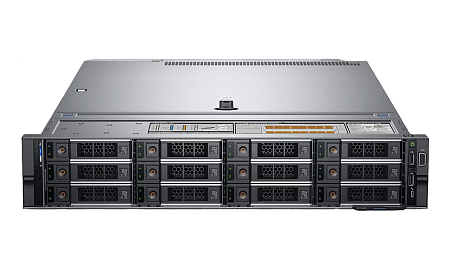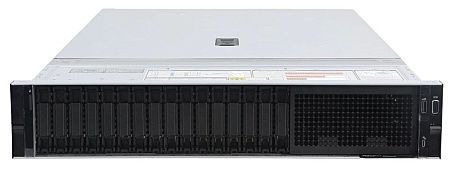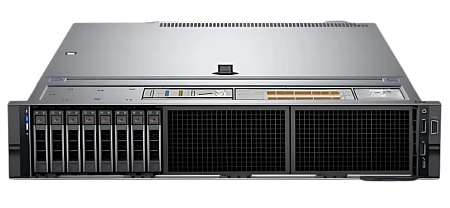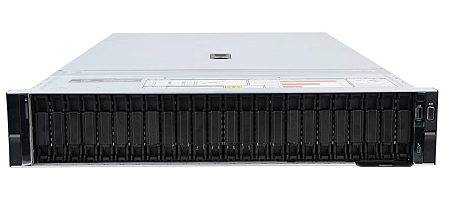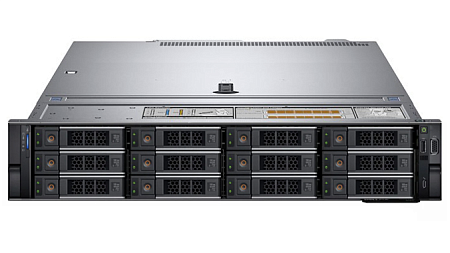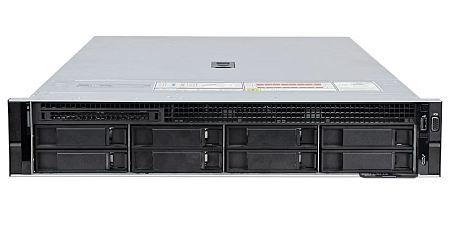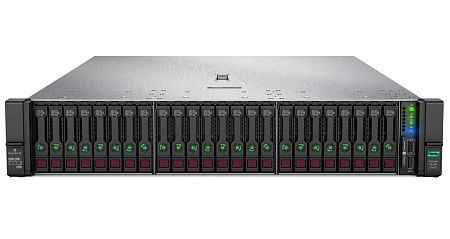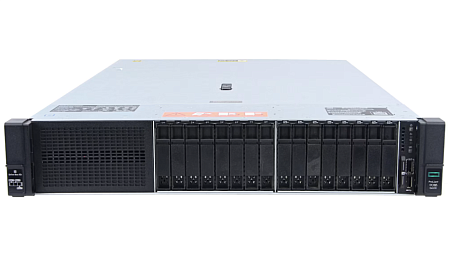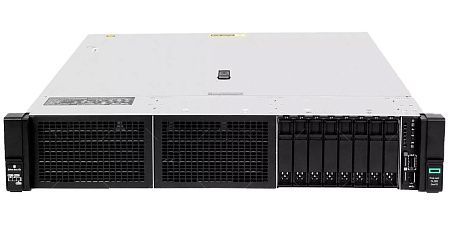There was a pronounced shortage of innovative flexible solutions in the corporate server manufacturing sector up until 2017. This was mainly due to the limited options in the market, which was historically dominated by Intel products. The introduction of the new AMD EPYC processor series has significantly improved the situation in the commercial solutions arena. Now, customers can choose the best technologies that can transform their data centers into a competitive advantage. In this article, we will discuss what the new server processors from AMD have to offer and the capabilities they can provide to users.
Contents:
- Business Orientation
- Comparative Table of Model Characteristics
- A Sensible Choice for Enhancing Business Efficiency
Customers accustomed to tried-and-tested solutions might ask, "Why should I choose a new product when the old one works just fine?". But technology never stands still – new developments can offer businesses many more opportunities than familiar solutions. Especially considering that the AMD EPYC 7003 series, which has incorporated the best features of its predecessors and can rightly be called innovative, has every chance of becoming a real breakthrough for large enterprises.
Business Orientation
Over the past four years, AMD Corporation has been focusing on developing solutions tailored for small, medium, and large businesses, with a clear aim to challenge Intel's position. This led to the introduction of the new AMD EPYC series of processors, prioritizing key enterprise factors such as:
- Security
- High performance
- Ease of integration
- Unique intellectual solutions
The improved processor configuration allows for easy integration into existing x86 architecture infrastructures. Customers don't have to worry about transitioning from other products since AMD EPYC CPUs can run almost all x86-based applications without the need to learn a new platform.
So, what exactly do AMD's marketers promise their customers?
Ease of Upgrade
The fear of prolonged updating, problematic integration, or high integration costs is a major reason why hardware owners are hesitant to experiment with new products. However, with the third-generation EPYC, these concerns are unfounded. The processors are fully compatible with motherboards for the second-generation EPYC and retain their functionality when transitioning to the new enhanced chips.
Enhanced Performance
As the challenges grow, so do performance requirements. Third-generation EPYC processors keep pace with these demands, significantly reducing the return on investment time due to their ability to process large data volumes quickly. This is evidenced by a 19% IPC increase, achieved through the addition of more cores (see the comparative table) and 32 MB of third-level cache for each core.
Security
Of course, a primary requirement for any processor's operation is to ensure the highest level of data security. This parameter is provided on the third-generation EPYC processors in collaboration with the AMD Infinity Guard security system, which mandatorily includes:
- Secure Encrypted Virtualization (SEV)
- Secure Nested Paging extension (SEV-SNP)
- Encrypted State Memory (SEV-ES)
AMD EPYC™ processors encrypt data during processing, further enhancing the overall security level.
This was a general overview. Next, we will look into the variety of models and their specifications in detail.
Comparative Table of Model Characteristics
AMD EPYC™ 7001 Series
|
Model |
CPU cores |
Threads |
Base frequency |
Max. frequency |
L3 cache size |
Socket |
PCI Express® version |
Nominal TDP / TDP |
System Memory Specification |
System Memory Type |
Memory channels |
Per Socket Mem BW |
|
7251 |
8 |
16 |
2.1GHz |
Up to 2.9GHz |
32MB |
1P/2P |
PCIe 3.0 x128 |
120W |
Up to 2400MHz |
DDR4 |
8 |
153.60 GB/s |
|
7261 |
2.5GHz |
64MB |
155W/ 170W |
2400MHz/ 2666MHz |
153.60 GB/s/ 170.60 GB/s |
|||||||
|
7351P |
16 |
32 |
2.4GHz |
1P |
||||||||
|
7351 |
1P/2P |
|||||||||||
|
7301 |
2.2GHz |
Up to 2.7GHz |
||||||||||
|
7281 |
2.1GHz |
32MB |
||||||||||
|
7401P |
24 |
48 |
2.0GHz |
Up to 3.0GHz |
64MB |
1P |
||||||
|
7401 |
1P/2P |
|||||||||||
|
7501 |
32 |
64 |
||||||||||
|
7551 |
180W |
Up to 2666MHz |
170.60 GB/s |
|||||||||
|
7551P |
1P |
|||||||||||
|
7451 |
24 |
48 |
2.3GHz |
Up to 3.2GHz |
1P/2P |
|||||||
|
7601 |
32 |
64 |
2.2GHz |
|||||||||
|
7371 |
16 |
32 |
3.1GHz |
Up to 3.8GHz |
200W |
AMD EPYC™ 7002 Series
|
Model |
CPU cores |
Threads |
Base frequency |
Max. frequency |
L3 cache size |
Socket |
PCI Express® version |
Nominal TDP / TDP |
System Memory Specification |
System Memory Type |
Memory channels |
Per Socket Mem BW |
|
7232P |
8 |
16 |
3.1GHz |
Up to 3.2GHz |
32MB |
1P |
PCIe 4.0 x128 |
120W |
Up to 3200MHz |
DDR4 |
8 |
85.30 GB/s |
|
7252 |
64MB |
1P/2P |
||||||||||
|
7272 |
12 |
24 |
2.9GHz |
|||||||||
|
7282 |
16 |
32 |
2.8GHz |
|||||||||
|
7302 |
3.0GHz |
Up to 3.3GHz |
128MB |
155W |
204.80 GB/s |
|||||||
|
7302P |
1P |
|||||||||||
|
7352 |
24 |
48 |
2.3GHz |
Up to 3.2GHz |
1P/2P |
|||||||
|
7452 |
32 |
64 |
2.35GHz |
Up to 3.35GHz |
||||||||
|
7262 |
8 |
16 |
3.2GHz |
Up to 3.4GHz |
||||||||
|
7F32 |
3.7GHz |
Up to 3.9GHz |
180W |
|||||||||
|
7402 |
24 |
48 |
2.8GHz |
Up to 3.35GHz |
||||||||
|
7402P |
1P |
|||||||||||
|
7502P |
32 |
64 |
2.5GHz |
|||||||||
| 7502 |
1P/2P |
|||||||||||
| 7542 |
2.9GHz |
Up to 3.4GHz |
225W |
|||||||||
|
7532 |
2.4GHz |
Up to 3.3GHz |
256MB |
200W |
||||||||
|
7552 |
48 |
96 |
2.2GHz |
192MB |
||||||||
|
7702 |
64 |
128 |
2.0GHz |
Up to 3.35GHz |
256MB |
|||||||
|
7702P |
1P |
|||||||||||
|
7662 |
Up to 3.3GHz |
1P/2P |
225W |
|||||||||
|
7742 |
2.25GHz |
Up to 3.4GHz |
||||||||||
|
7H12 |
2.6GHz |
Up to 3.3GHz |
280W |
|||||||||
| 7642 |
48 |
96 |
2.3GHz |
225W |
||||||||
|
7F52 |
16 |
32 |
3.5GHz |
Up to 3.9GHz |
240W |
|||||||
|
7F72 |
24 |
48 |
3.2GHz |
Up to 3.7GHz |
192MB |
AMD EPYC™ 7003 Series
|
Model |
CPU cores |
Threads |
Base frequency |
Max. frequency |
L3 cache size |
Socket |
PCI Express® version |
Nominal TDP / TDP |
System Memory Specification |
System Memory Type |
Memory channels |
Per Socket Mem BW |
|
7313P |
16 |
32 |
3.0GHz |
3.7GHz |
128MB |
1P |
PCIe 4.0 x128 |
155W |
Up to 3200MHz |
DDR4 |
8 |
204.80 GB/s |
|
7313 |
1P/2P |
|||||||||||
|
7413 |
24 |
48 |
2.65GHz |
3.6GHz |
180W |
|||||||
|
7443P |
2.85GHz |
4.0GHz |
1P |
200W |
||||||||
|
7443 |
1P/2P |
|||||||||||
|
7513 |
32 |
64 |
2.6GHz |
3.65GHz |
||||||||
|
7343 |
16 |
32 |
3.2GHz |
3.9GHz |
190W |
|||||||
|
7453 |
28 |
56 |
2.75GHz |
3.45GHz |
64MB |
225W |
||||||
|
7543 |
32 |
64 |
2.8GHz |
3.7GHz |
256MB |
|||||||
|
7543P |
1P |
|||||||||||
|
7643 |
48 |
96 |
2.3GHz |
3.6GHz |
1P/2P |
|||||||
|
7713P |
64 |
128 |
2.0GHz |
3.675GHz |
1P |
|||||||
|
7713 |
1P/2P |
|||||||||||
|
7663 |
56 |
112 |
3.5GHz |
240W |
||||||||
|
73F3 |
16 |
32 |
3.5GHz |
4.0GHz |
||||||||
|
74F3 |
24 |
48 |
3.2GHz |
|||||||||
|
75F3 |
32 |
64 |
2.95GHz |
280W |
||||||||
|
7763 |
64 |
128 |
2.45GHz |
3.5GHz |
||||||||
|
72F3 |
8 |
16 |
3.7GHz |
4.1GHz |
180W |
A Sensible Choice for Enhancing Business Efficiency
In today's world, data security and high performance are paramount concerns. The third-generation AMD EPYC processors are one of the best options that meet all business requirements.
If you have any questions about which processor to choose, or if you would like to purchase server equipment based on AMD EPYC processors, you can always reach out to Newserverlife for consultation and assistance in selecting a solution.
Specialists of our company are ready to help you purchase the server and select the necessary server configuration for any required task.



